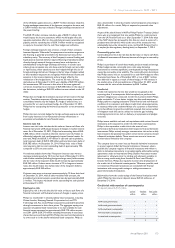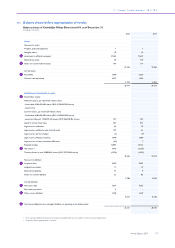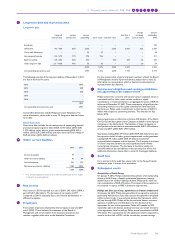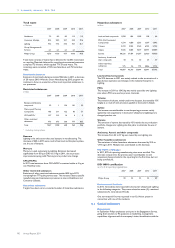Philips 2011 Annual Report Download - page 183
Download and view the complete annual report
Please find page 183 of the 2011 Philips annual report below. You can navigate through the pages in the report by either clicking on the pages listed below, or by using the keyword search tool below to find specific information within the annual report.
14 Sustainability statements 14 - 14
Annual Report 2011 183
14 Sustainability statements
Approach to sustainability reporting
Philips has a long tradition of sustainability reporting, beginning in 1999
when we published our first environmental annual report. We
expanded our reporting in 2003 with the launch of our first
sustainability annual report, which provided details of our social and
economic performance in addition to our environmental results.
In 2012, we published our fourth annual integrated financial, social and
environmental report, reflecting the progress we have made embedding
sustainability in our way of doing business. This is also supported by the
inclusion of sustainability in the Philips Management Agenda and the
company strategy.
Reporting standards
We have followed relevant best practice standards and international
guidelines while compiling the sustainability performance covered in
this report. Most important are the Global Reporting Initiative’s (GRI)
G3.1 Sustainability Reporting Guidelines.
With regard to the GRI Application Levels system, we assessed
ourselves at the A+ level. A detailed overview of our Management
Approach and the G3.1 Core Indicators is provided at the end of this
section.
We signed on to the United Nations Global Compact in March 2007,
joining thousands of companies from all regions of the world as well as
international labor and civil society organizations to advance 10
universal principles in the areas of human rights, labor, the environment
and anti-corruption. Our General Business Principles, Sustainability and
Environmental Policies, and our Supplier Sustainability Declaration are
the cornerstones that enable us to live up to the standards set by the
Global Compact. This is closely monitored and reported, as illustrated
throughout this report, which is our annual Communication on
Progress (COP) submitted to the UN Global Compact Office.
Tracking trends
We continuously follow external trends to determine the issues most
relevant for our company and those where we can make a positive
contribution to society at large. In addition to our own research, we
make use of a variety of sources, including the United Nations
Environmental Programme (UNEP), World Bank, World Business
Council for Sustainable Development (WBCSD), World Economic
Forum and World Health Organization. Our work also involves
tracking topics of concern to governments, regulatory bodies,
academia, and non-governmental organizations, and following the
resulting media coverage.
Stakeholder engagement
Across all our activities we seek to engage stakeholders to gain their
feedback on specific areas of our business. Working in partnerships is
crucial in delivering on our commitment to bring “sense and simplicity”
to people’s health and well-being. We participate in meetings and task
forces as a member of organizations including the WBCSD, Electronic
Industry Citizenship Coalition (EICC), Carbon Disclosure Project
Supply Chain, European Committee of Domestic Equipment
Manufacturers (CECED), Federation of National Manufacturers
Associations for Luminaires and Electrotechnical Components for
Luminaires in the European Union (CELMA), European Coordination
Committee of the Radiological, Electromedical and Healthcare IT
Industry (COCIR), Digital Europe, European Lamp Companies
Federation (ELC), European Roundtable of Industrialists (ERT),
National Electrical Manufacturers Association (NEMA), Environmental
Leadership Council of the Information Technology Industry Council
(ELC ITIC), Consumer Electronics Association (CEA), Association of
Home Appliance Manufacturers (AHAM) and Healthcare Plastics
Recycling Council (HPRC).
In 2011, a multi-stakeholder project with the Sustainable Trade
Initiative (IDH), a number of NGOs, and electronic companies was
started. The program focuses on improving working circumstances in
the electronics industry in China.
Furthermore, we engaged with a number of NGOs, including Enough,
GoodElectronics, MakeITfair, the leading Dutch labor union (FNV), the
Chinese Institute of Public and Environmental Affairs, SOMO, Amnesty
International and Greenpeace.
The Philips Center for Health and Well-being
Philips seeks to address key societal issues and solutions relating to
themes such as healthy and active aging, livable cities and healthy
lifestyles through The Philips Center for Health and Well-being. The
Center was launched in December 2009 and brings together teams of
multidisciplinary experts from all over the world in think tanks.
Participants include NGOs such as the World Bank, Global Health
Council, European Patient’s Forum, ISOCARP (international
association of urban planners), and global experts on each of the
respective subjects. The aging well think tank works from the US and
is debating how aging populations can remain independent and engaged
through their life transitions. The livable cities think tank works from
Singapore and Shanghai, and is taking a holistic view of a livable city
and is defining “livability” which includes a city being resilient,
sustainable, authentic and inclusive. Additionally, the Philips Index for
Health & Well-being is a global research project being conducted by
the Center. It aims to identify what citizens find important when it
comes to their health and well-being. The research examines the mega-
trends that shape each nation’s healthcare, lifestyle and who we are as a
society, with a focus on what aspects of health and well-being are most
important. It was conducted in 31 countries during 2010 and 2011, with
over 31,000 consumers surveyed. In addition, during 2011 the Center
also conducted a survey on parents and parenting in 7 countries across
the world, asking parents about their health & well-being, their
experiences of childbirth and breastfeeding and their concerns for their
children’s future. For more information on the work of the Center, go
to www.philips-thecenter.org.
Working on global issues
In 2011, Philips participated in the United Nations Climate Change
Conference in Durban, South Africa. We partnered with other leading
industry players, governmental organizations, NGOs (like The Climate
Group) and the United Nations Environmental Program to create a
global sectoral agreement on phasing out inefficient lighting.
In 2011, to mark Philips’ 120th anniversary, we organized the Philips
Innovation Experience. As our innovations address key societal
developments − e.g. reforming healthcare, improving the livability of
our cities and promoting healthy lifestyles − we firmly believe that true
innovation is not achieved in isolation, but thrives on constructive
dialogue with all stakeholders involved. To fuel this dialogue, about 100
thought leaders and decision makers, more than 100 media
representatives, employees and students convened for the interactive
event on Innovation for Health and Well-being in the Evoluon in
Eindhoven, The Netherlands.
Biodiversity
Philips has continued to progress on the subject of biodiversity in 2011
and participated for the 4th year running in the IUCN NL Leaders for
Nature programs. In December 2011 Philips and 10 other Dutch and
multinational companies signed a statement of intent to address
biodiversity and ecosystem restoration in the Netherlands and abroad
during which the Dutch Taskforce Biodiversity and Natural Resources
presented their final report to the Dutch government.
The participating companies intend to work together during the coming
20 years to protect and restore biodiversity and ecosystems. To begin
with partner companies will work on a pilot project to improve
biodiversity on joint company premises, linking green areas and thereby
increasing biodiversity. The partner companies will also share best
practices on closing the materials loop, supply chain sustainability, and
processes. This is especially important in view of increasing risks
concerning the prices and availability of new and recycled materials, and
non-renewable energy.
The partner companies realize that limits of growth are being
determined by the status of our ecosystems and only by working
together can we learn how to grow sustainably. Philips policy continues
to focus on:
























